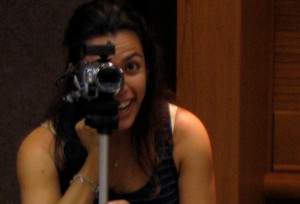 About the Program
About the Program
A psychologist and former cancer patient, Dan Shapiro noticed that his physicians had little understanding of the day to day struggles associated with living with serious illness. In 2006 he began giving 2nd year medical students video cameras, and asking them to make documentaries about patient’s lives over 8 months. The students had to make at least three visits, film an interaction with medical professionals, and also interview other people in the patient’s life. Supported by a professorship from the Arnold P. Gold Foundation, the “Video Slam” project has now generated over 30 short films (under ten minutes) that are used in medical schools across the country. The students at the University of Arizona and the Penn State College of Medicine have reported that the project has had a major impact on their medical education. Zachary Simmons, M.D., who treats patients with Amyotrophic Lateral Sclerosis (also known as Lou Gehrig’s Disease) said this of the project: “I’ve been treating patients with ALS for over 14 years, and from these films I learned that there is a great deal my patients go through at home that I had no idea about.”
The films can be seen at: http://pennstatehershey.org/web/humanities/home/projects/medicalstudentfilms
Shapiro has initiated a new project at Penn State, also supported by the Arnold P. Gold Foundation. In “The Innovations in Patient Centered Care film project” medical students make documentaries about clinical units that have changed how they practice to make their care more patient or family centered. For example, students have filmed a Neurology Walk-in Clinic where neurologists see new patients and a Neonatal Intensive Care Unit and their new Family Centered Rounds.
Shapiro has initiated a new project at Penn State, also supported by the Arnold P. Gold Foundation. In “The Innovations in Patient Centered Care film project” medical students make documentaries about clinical units that have changed how they practice to make their care more patient or family centered. For example, students have filmed a Neurology Walk-in Clinic where neurologists see new patients and a Neonatal Intensive Care Unit and their new Family Centered Rounds.





